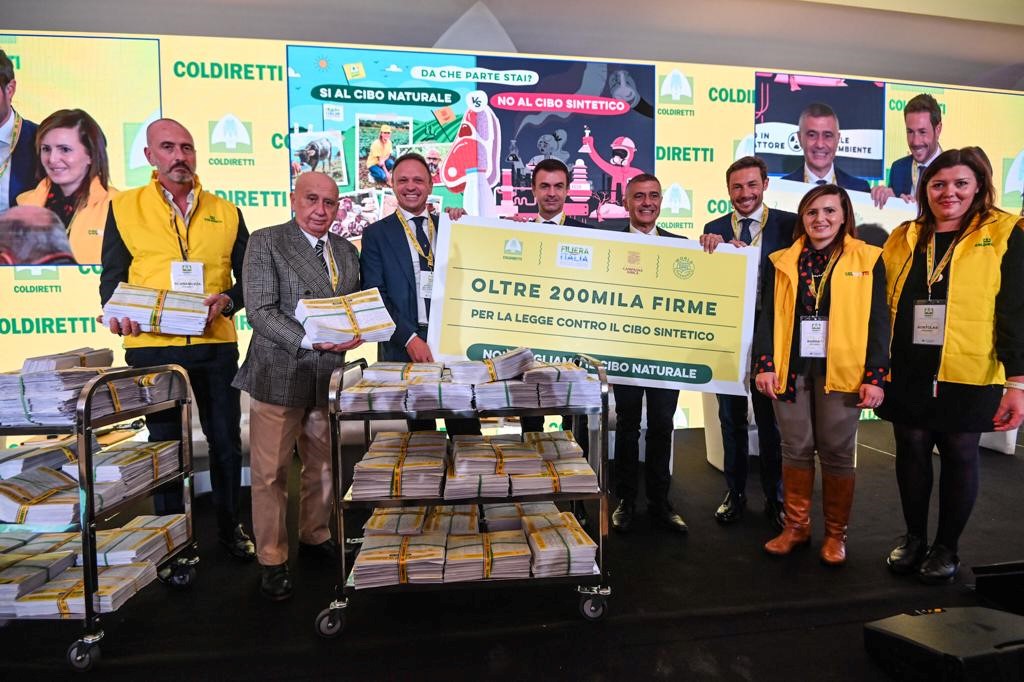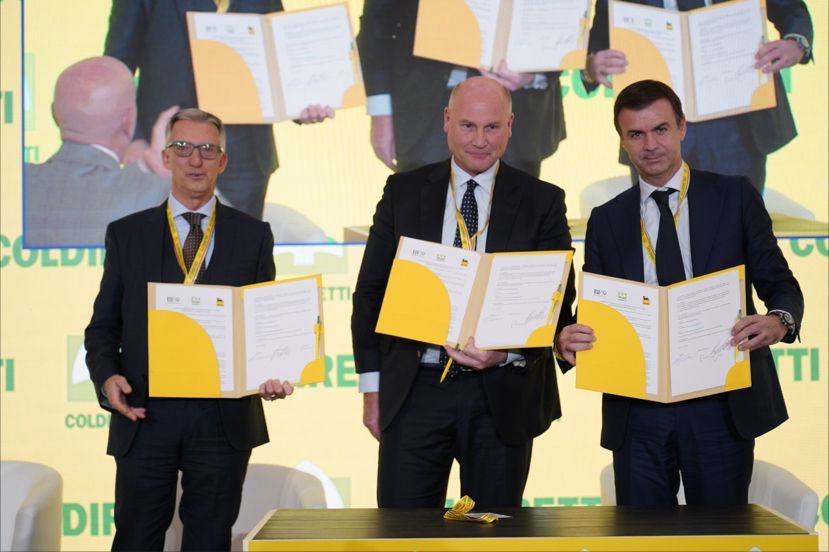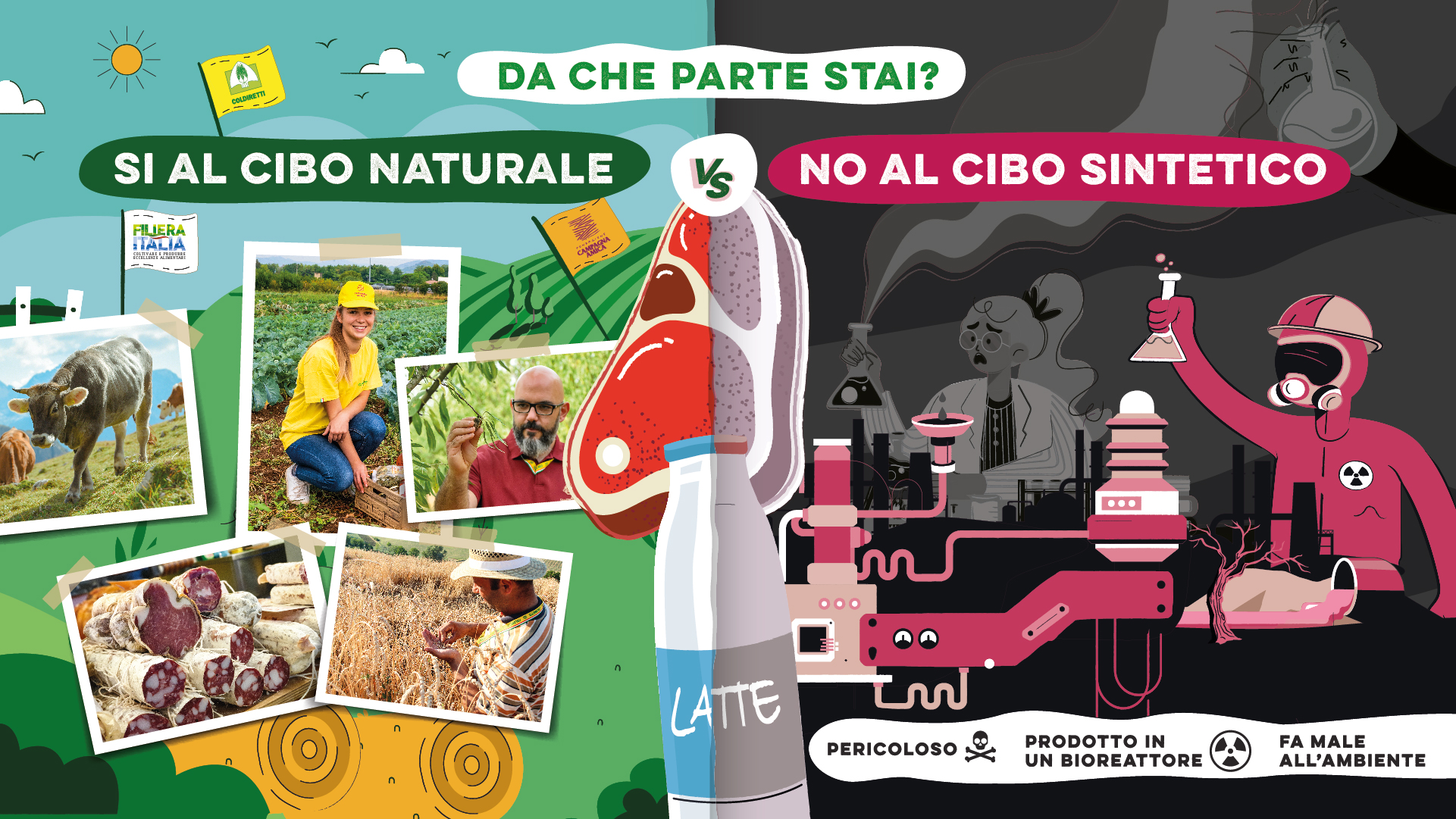Many topics were addressed in the 20th edition of the Annual International Forum of Agriculture and Food, organized by Coldiretti, which was held in Rome at Villa Miani on 24 and 25 November. In his closing speech, Ettore Prandini – Coldiretti President – expressed his satisfaction with the constructive dialogue expressed by a strong alliance of institutions, scientists, economists, analysts, doctors, all in agreement on the need to protect the well-being of the community.
Al summit ha partecipato un parterre ricchissimo di rappresentanti del governo italiano, di esperti e responsabili di grandi aziende: dall’Enel alla Tim, dall’Eni alla Philip Morris, da Bonifiche Ferraresi fino alle Ferrovie dello Stato.
The agricultural and agri-food issue was addressed in a 360-degree vision, emphasizing the points of contact that this sector has with the economy, technology, and the new challenges of renewable energy.

There was ample talk of “cultured meat” and the risks that this entails for the environment and the health of citizens. Through the projection of a film, the numerous fakes on the capacity that this lab-grown meat has on emissions and nutritional values have been broken down on a scientific basis. The methane emitted by farms remains in the atmosphere for about 12 years, while the CO2 linked to the production of synthetic meat persists and accumulates for millennia. Also, the residues from biotechnological processes are like hospital and pharmaceutical residues, which are highly polluting for water resources. Caution must be taken when, in the face of a high rate of cell proliferation, associated with the in vitro growth process, genetic instability of the cells can occur and be the cause of potential carcinogenic phenomena. The problem of synthetic food, which has already received an initial authorization from the US FDA, on which various interests are concentrated and in which gigantic financial and technological energies are invested, also concerns other sectors milk “without cows” and “fish without seas, lakes and rivers” followed by white meats, cheeses, fruit and vegetables and wine. Coldiretti has mobilized to counter this business which exploits the theme of sustainability, marginalizes traditions, cornering consumers and farmers and, during the Forum, presented to the Minister of Agriculture and Food Sovereignty Francesco Lollobrigidaa collection of 200,000 signatures against the production, use and marketing of synthetic food.

The protection of the quality of the Italian food model, recognized as a UNESCO heritage site, places at the forefront the question of the indication of origin on the label with a clear reference to the Nutriscore, the subject of heated discussion in the EU. Italy is against this choice of “traffic light” nutrition label because it penalizes and delegitimizes the Mediterranean diet. In this regard, Prandini appreciated the commitment of Minister Patuanelli and the Italian Government to give continuity to the indication of origin on products from the main food supply chains, stating that “we must export our model which relies on distinctiveness and transparency in the European Union because European consumers too must be aware of what they eat”.
Dai risultati di una ricerca effettuata da Coldiretti è emerso che il cibo è diventato la prima ricchezza dell’Italia con un valore di 580 miliardi di euro, oggi vale quasi un quarto del Pil nazionale e, dal campo alla tavola, vede impegnati 4 milioni di lavoratori in 740 mila aziende agricole e 70 mila industrie alimentari. Quest’anno è stato registrato un record storico con un incremento del 16%, nonostante la pandemia e la guerra in Ucraina. Ottimi i risultati anche delle esportazioni, cresciute del 10% e che, secondo il Ministro Patuanelli, potrà a breve raggiungere l’obiettivo dei 100 miliardi di export.
Un altro argomento su cui si è dibattuto riguarda l’innovazione tecnologica, Coldiretti è pronta a rafforzare la posizione di tutte le imprese agricole, dell’allevamento e florovivaistiche, cavalcando con coraggio le nuove tecnologie, dalle rinnovabili alla cisgenetica e Nbt fino alla digitalizzazione e l’utilizzo dei droni, dei satelliti e di tutte le attrezzature meccaniche più evolute, ricordando che l’industria meccanica nazionale è un riferimento a livello mondiale. L’agricoltura è pronta a cogliere sfide e opportunità oggi tangibili. Ma è fondamentale che si possa competere ad armi pari, a livello nazionale ed europeo, per risolvere il problema del mancato riconoscimento della giusta redditualità ai produttori che, in questo periodo sono appesantiti da ulteriori costi di gestione dovuti agli aumentati costi energetici. Coldiretti ha ribadito l’impegno forte sul fronte delle rinnovabili perché rappresentano un ulteriore modello per sviluppare la ricerca e rendere le imprese italiane sempre più competitive oltre che sostenibili.

The important collaboration agreement signed by BF with Eni to evaluate the development of crops for energy use in Italy, recovering degraded, abandoned, or polluted land, without competing with the food chain, fits into this issue. “The alliance between Eni and BF is consolidated with Progetto Italia which demonstrates the essential role of agriculture in the diversification of energy sources. In addition to the R&D activities of the JV in our company in Sardinia, we are starting today to a new initiative which involves the study and subsequent production of the first 2,000 national hectares of land used for the cultivation of oilseeds. The project will enhance abandoned areas of the country, recovering and inserting them in a virtuous circuit which at the same time will give Italian agricultural entrepreneurs new diversification opportunities for their activities”, declared Federico Vecchioni, CEO of BF Spa..
At the conclusion of the two days of the Forum, many promises were received from the institutions. The Government’s commitment to support and promote choices capable of giving greater impetus to a long-term strategy that can favor the development of the entire agricultural chain was clearly expressed. It was also clearly expressed its commitment to investments in infrastructure, ports, dry ports, and high-speed lines for the transport of goods and, last but not least, the construction of a network of new water storage basins, to combat drought and achieve productive self-sufficiency. Finally, the President of Coldiretti, Ettore Prandini, thanked Bonifiche Ferraresi, the largest Italian agricultural company and one of the most important in Europe, which has made a platform available to small enterprises to offer everyone equal development opportunities..



